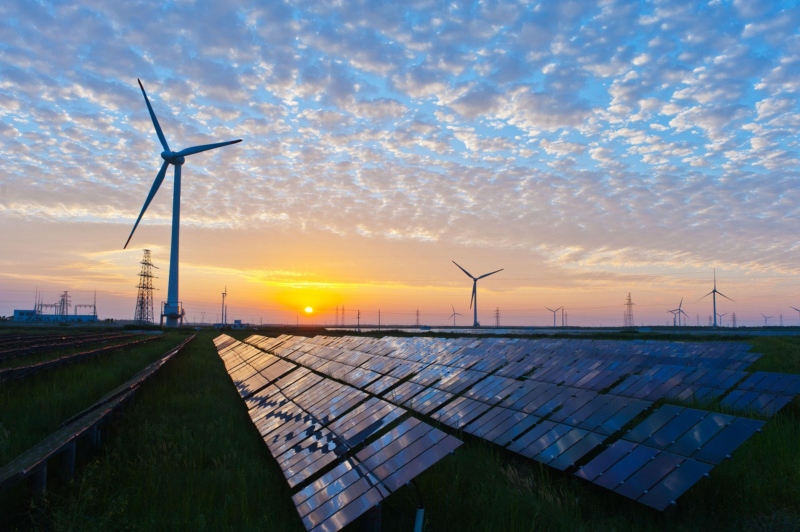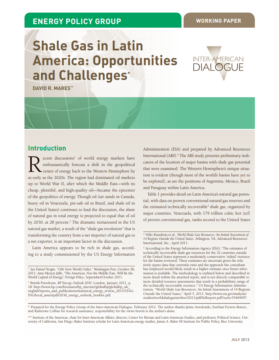Bolivia & the Global Fight Against Climate Change
In the past year, the Bolivian government has emerged as an outspoken critic of climate change policies.
As Latin America moves towards reducing greenhouse gas emissions and fulfilling its Paris commitments, it must also work to meet rapidly growing electricity demand, which is projected to almost double by 2040. Latin America has the cleanest power sector in the world, with over half of its electricity generated by large hydroelectric dams, but the region still faces many obstacles to decarbonizing its power sector. On July 6th, the Inter-American Dialogue welcomed Walter Vergara, senior fellow at the World Resources Institute, Samantha Gross, fellow at the Brookings Institution’s Energy and Climate Initiative, and Gabriela Elizondo Azuela, senior energy specialist at the World Bank Group to discuss the opportunities and challenges associated with growing the share of clean power in the region.
Latin America is uniquely positioned to transition to a fully decarbonized power sector given its abundant natural resources. The rapid improvement of technology for non-conventional renewable energy generation will also continue to drive down costs and create more opportunities to commercialize renewables. But the region’s growing share of clean power still faces many obstacles, such as the intermittent nature of non-conventional renewables like solar and wind energy. Natural gas and hydropower can both be used to complement these intermittent sources, but each faces its own challenges. As the effects of climate change intensify, extreme whether events like El Niño are becoming more frequent and more severe, making hydropower less reliable. Strong opposition from local communities is also an obstacle to expanding existing hydropower capacity. Natural gas, while inexpensive, abundant, and compatible with existing infrastructure, is not a zero-carbon energy source, and debate remains as to whether it can act as a “bridge fuel” in the path to a zero-carbon future or if future investments should be entirely directed towards renewables, energy storage, and energy efficiency.
An integrated regional energy market would also help balance intermittent unconventional renewables, provide greater energy security, and help decrease the cost of power throughout the region. But political obstacles, lack of coordination between governments and utilities in the region, and underinvestment and underutilization of existing infrastructure continue to complicate efforts to further integration.
The transition towards zero-carbon electricity generation is critical not only for the power sector, but for reducing emissions from the transport sector through electric vehicles. The transport sector is the largest and fastest-growing source of energy-related emissions in the region. As urban transportation in many Latin American cities is dominated by public transportation, electrifying the region’s bus fleets would yield important gains in emissions reductions and air quality improvements. But the electrification of private vehicles is also critical, as the region has the highest motorization rate in the world. The Dialogue’s Green Transportation: The Outlook for Electric Vehicles in Latin America report details the importance of and challenges associated with electrifying this sector. Looking ahead, technological advances such as smart charging stations that allow power from idle electric vehicles to be fed back to the power grid could also act as a storage solution for intermittent renewables, helping provide a secure source of clean power during peak demand hours.
Many countries – like Nicaragua, Costa Rica, and Uruguay – have already made enormous strides towards decarbonizing their power sectors and others – like Chile – have ambitious plans to do so in the coming decades. While challenges to decarbonizing the power sector remain, the region as a whole remains committed to reducing emissions and combating climate change, which will also pay dividends in terms of energy security and urban air quality.
Download Walter Vergara’s presentation below.
In the past year, the Bolivian government has emerged as an outspoken critic of climate change policies.
As global temperatures continue to rise with the global community stalled on any way to stop them, countries must prepare to adapt to increasingly volatile environmental conditions.
Unless resource nationalism can be made compatible with providing incentives for significant foreign participation, it may be too early to start trumpeting a bonanza for Latin America.

